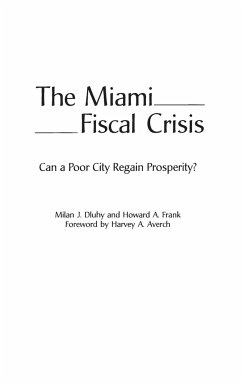Analyzes Miami's fiscal insolvency since 1996, drawing heavily on contributing cultural and ethnic factors. Drawing heavily on contributing cultural and ethnic factors, this book analyzes Miami's fiscal insolvency since 1996 and describes what led to the financial crisis, the explanations for the crisis, and the reasons for a slow recovery. Comparing Miami's insolvency with the earlier fiscal crises in Philadelphia, New York City, and Orange Country, CA, the authors show the role of Miami's poor economic climate, the increasing ethnic influence, the emphasis on fiscal conservatism and a pay as you go philosophy, the lack of standard and professional budgetary practices, and the corruption of several city officials. In conclusion, the authors consider Miami's outlook for the future. To fully understand Miami's original crisis and the extremely slow financial recovery, the authors believe it is necessary to explore how the dominant culture contributed to the city's financial problems. The book shows that structural features of the local government are less important than broader cultural and ethnic attitudes and practices.
Hinweis: Dieser Artikel kann nur an eine deutsche Lieferadresse ausgeliefert werden.
Hinweis: Dieser Artikel kann nur an eine deutsche Lieferadresse ausgeliefert werden.








